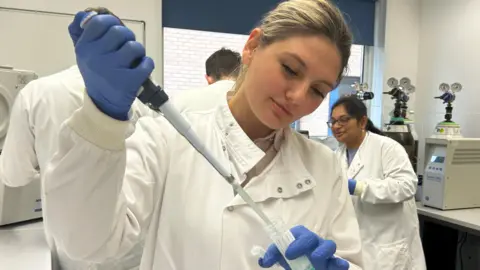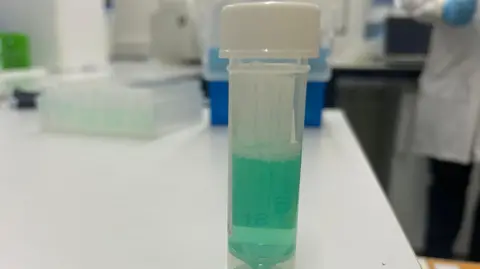Mouth bacteria 'may indicate future brain health'
 BBC
BBCCertain bacteria found in people's mouths may be linked to changes in brain function as you age, experts have said.
The study, led by the University of Exeter, found certain types of bacteria were associated with better memory and attention, while others were linked to poor brain health and Alzheimer's disease.
Lead author Dr Joanna L'Heureux said: "We might be able to predict if you have the Alzheimer's gene even before you start getting problems or think about going to the doctor for a diagnosis."
The research is in early stages but study leads say they are now investigating whether eating certain healthy foods, such as nitrate-rich leafy greens, can influence brain health by boosting certain bacteria.

Co-author Prof Anne Corbett said: "The implication of our research is profound."
She said: "If certain bacteria support brain function while others contribute to decline, then treatments that alter the balance of bacteria in the mouth could be part of a solution to prevent dementia.
"This could be through dietary changes, probiotics, oral hygiene routines, or even targeted treatments."
The study recruited 115 volunteers, over the age of 50, who had already carried out cognitive tests as part of another project.
Researchers split them into two groups - those with no issues with their brain function decline and those with some mild cognitive problems.
The participants in both groups sent in mouth rinse samples that were then analysed and the bacteria populations studied.

The university said people who had large numbers of the bacteria groups Neisseria and Haemophilus had better memory, attention and ability to do complex tasks.
However, Dr L'Heureux said she found greater levels of the bacteria, Porphyromonas, in individuals with memory problems.
Whereas, she said, the bacterial group Prevotella was linked to low nitrite, which was more common in people that carried the Alzheimer's disease risk gene.
Dr L'Heureux said: "We would recommend you have things like beetroot. leafy greens like spinach, rocket, lettuces, lots of salads and reduce consumption of things like alcohol and highly processed sugary foods."
Leafy greens are some of the biggest natural sources of nitrates.
Prof Anni Vanhatalo, associate pro-vice chancellor for research and impact at the university, said: "In the future, we could collect these [mouth] samples as part of GP appointments and get them processed to give an early indication if someone is at elevated risk."
Follow BBC Devon on X, Facebook and Instagram. Send your story ideas to spotlight@bbc.co.uk.